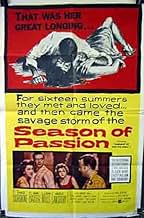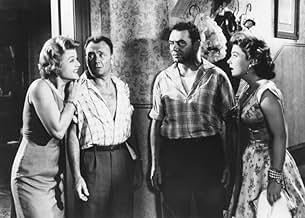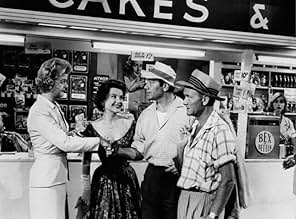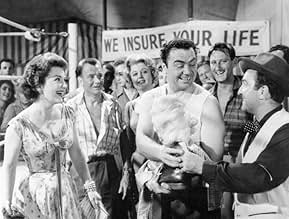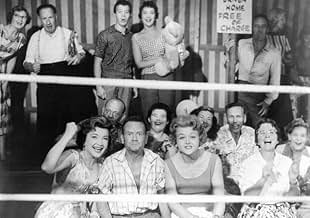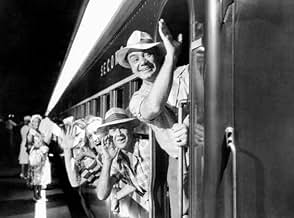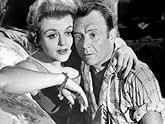IMDb RATING
5.9/10
337
YOUR RATING
Two Australian sugarcane cutters spend their annual five-month vacations in Sydney with their mistresses.Two Australian sugarcane cutters spend their annual five-month vacations in Sydney with their mistresses.Two Australian sugarcane cutters spend their annual five-month vacations in Sydney with their mistresses.
- Director
- Writers
- All cast & crew
- Production, box office & more at IMDbPro
Featured reviews
Many years ago I unwisely took part in an amateur production of Thornton Wilder's "The Matchmaker". I can still hear the mayhem created by those of us who tried, and failed miserably, to achieve an American accent and those (including, bizarrely, a stray Welshman) who just gave up and spoke their native idiom. Luckily out home-town audience was very forgiving and the local rag took pity on us.
This dire experience came back to me when I saw "Summer of the Seventeenth Doll", but even so, not having seen the original stage play by Ray Lawler, I didn't realise how badly it had been butchered until I saw a TV performance by the Melbourne Theatre Company. The first reaction of an Australian audience will be to switch off because of the hilarious mangling of their native speech by an all-star cast who deserved better and would have been more gainfully employed on another project. Maybe that wouldn't matter to a foreign audience, but then again, perhaps the resultant strange mixture of assorted Cockney, Bronx and other sounds would have a subtly disturbing effect on any listener.
Of more concern is the fact that the play's essence can't be divorced from its Australian roots, which include deceptively dry, laconic and understated speech cadences, without making it pretty meaningless. In fact it's the very antithesis of the overwrought, borderline- histrionic style of "serious" Hollywood films of the era. Anyone less like a laconic Queensland canecutter than the furiously emoting Ernest Borgnine would be hard to imagine. And switching the location from Melbourne to more photogenic Sydney settings, while trivial in itself, is symptomatic of the filmmakers' imperfect understanding of their vehicle.
I don't know that "Doll" is a great play, but it is a good one. However, given the need for some audience-pulling names there was no real prospect of doing it properly in 1959. The accent problem, which is just part of the underlying cultural mismatch, is not to be dismissed, and I've never heard an American or British actor come close to a convincing Australian accent - even Meryl Streep. Even nowadays, with many high-visibility Australians in Hollywood, it would be a problematic vehicle because at bottom it's pretty stagy. It's just one of those movies that shouldn't have been made.
This dire experience came back to me when I saw "Summer of the Seventeenth Doll", but even so, not having seen the original stage play by Ray Lawler, I didn't realise how badly it had been butchered until I saw a TV performance by the Melbourne Theatre Company. The first reaction of an Australian audience will be to switch off because of the hilarious mangling of their native speech by an all-star cast who deserved better and would have been more gainfully employed on another project. Maybe that wouldn't matter to a foreign audience, but then again, perhaps the resultant strange mixture of assorted Cockney, Bronx and other sounds would have a subtly disturbing effect on any listener.
Of more concern is the fact that the play's essence can't be divorced from its Australian roots, which include deceptively dry, laconic and understated speech cadences, without making it pretty meaningless. In fact it's the very antithesis of the overwrought, borderline- histrionic style of "serious" Hollywood films of the era. Anyone less like a laconic Queensland canecutter than the furiously emoting Ernest Borgnine would be hard to imagine. And switching the location from Melbourne to more photogenic Sydney settings, while trivial in itself, is symptomatic of the filmmakers' imperfect understanding of their vehicle.
I don't know that "Doll" is a great play, but it is a good one. However, given the need for some audience-pulling names there was no real prospect of doing it properly in 1959. The accent problem, which is just part of the underlying cultural mismatch, is not to be dismissed, and I've never heard an American or British actor come close to a convincing Australian accent - even Meryl Streep. Even nowadays, with many high-visibility Australians in Hollywood, it would be a problematic vehicle because at bottom it's pretty stagy. It's just one of those movies that shouldn't have been made.
Ray Lawler's play about two tempestuous sweetheart couples coping with the layoff season in Sydney, Australia comes to the screen without much humor and a misguided heart. Sugar cane cutters Ernest Borgnine and John Mills take Kewpie doll collector Anne Baxter and manicurist Angela Lansbury to South Australia to rest up and look for holiday work--but trouble brews with Borgnine, who has mysteriously left his job after fifteen years. Practically without plot, this character study has become, on film, a visual journey rather than an emotional or personable one. Paul Beeson's cinematography is certainly striking, even as the entangled relationships and mercurial tempers at the forefront of the story quickly wear themselves out. Forget about accents, these actors (interestingly, if unsuccessfully, cast) don't even look like Aussie natives. Borgnine's strong sense of character and natural way with a complicated chunk of dialogue nearly saves him, but it was a fundamental error to surround these stars with unknown players who really do sound like Australians. The lively section at the amusement park is full of raucous vitriol and Beeson's playful visual composition, but every scene back at the boarding house is a lost cause. A very strange project, indeed. ** from ****
Ernest Borgnine and John Mills star in this butchering of the Ray Lawlor play about cane cutters in the off - season.
Borgnine, known at the time as the star in "McHale's Navy", is the middle aged labourer (actually about 33 years old or so in the play) past his prime and Mills is his mate.
Angela Lansbury plays herself as a widow replacing Mills' girlfriend. In the play she was more salty than high class.
In the play, "Barney" - played by Mills - was still a fairly young man (still in his mid-ish twenties).
There is an odd scene where Bubba, the young ingenue is a barmaid filling up schooners with dregs (a Scottish bar ?).
Product placements - Peters Icecream (twice), Brylcreem, Toohey Old (twice), TAA (airlines), Tooths (beer) and Bex (twice - aspirin).
Borgnine, known at the time as the star in "McHale's Navy", is the middle aged labourer (actually about 33 years old or so in the play) past his prime and Mills is his mate.
Angela Lansbury plays herself as a widow replacing Mills' girlfriend. In the play she was more salty than high class.
In the play, "Barney" - played by Mills - was still a fairly young man (still in his mid-ish twenties).
There is an odd scene where Bubba, the young ingenue is a barmaid filling up schooners with dregs (a Scottish bar ?).
Product placements - Peters Icecream (twice), Brylcreem, Toohey Old (twice), TAA (airlines), Tooths (beer) and Bex (twice - aspirin).
It's odd that in this Australian film set in that beautiful country that none of the stars are, in fact, Australian! You've got two Americans (Ernest Borgnine and Anne Baxter) and two Brits (John Mills and Angela Lansbury) starring in this one! Sadly, the Aussie actors just weren't all that famous at the time and in a bid to get international box office money, they cast foreigners in this very Australian tale! If made today, at least they could have used Paul Hogan or Dame Edna, as they both are known internationally! Sadly, Borgnine sounded about as Australian as Charles Boyer, though the others at least sound reasonably good to this untrained ear.
As far as the story goes, it's about a couple guys who work the cane fields and then come back to the big city to have a good time with their mistresses. Not especially bad or good...and a film that never really impressed me one way or the other. This, combined with the casting, make this one I could easily have skipped.
As far as the story goes, it's about a couple guys who work the cane fields and then come back to the big city to have a good time with their mistresses. Not especially bad or good...and a film that never really impressed me one way or the other. This, combined with the casting, make this one I could easily have skipped.
This film was adapted from Ray Lawler's 1955 hit play, about the changes that the passing of time forces on each of us.
The play is considered a landmark of the Australian theatre for its naturalistic portrayal of the Australian working class, and the film has been criticised for having American and British actors in the four main roles, as well as some dilution of the Australian idioms for foreign audiences; and the inclusion of a more hopeful ending than the play. Despite these problems, the story is still an entertaining one, with shades of Tennessee Williams in its portrayal of human frailty.
It is also wonderful to see Sydney and its people in the 1950s, when so few Australian films were being made, and this film is an excellent time capsule of the era.
SPOILERS BELOW While the men Roo (Ernest Borgnine) and Barney (John Mills) have spent 16 idyllic summers in a Sydney guesthouse with a couple of Sydney girls Olive (Anne Baxter) and Nancy (Jessica Noad), this year Nancy has got tired of waiting each year for Barney to return, and found herself a husband. At the same time, Roo has lost his job as the head of the cane-cutting gang, and come home broke for the first time. While Olive finds another girl, Pearl (Angela Lansbury), for Barney, the old chemistry is gone, and the fun is thin on the ground.
The play is considered a landmark of the Australian theatre for its naturalistic portrayal of the Australian working class, and the film has been criticised for having American and British actors in the four main roles, as well as some dilution of the Australian idioms for foreign audiences; and the inclusion of a more hopeful ending than the play. Despite these problems, the story is still an entertaining one, with shades of Tennessee Williams in its portrayal of human frailty.
It is also wonderful to see Sydney and its people in the 1950s, when so few Australian films were being made, and this film is an excellent time capsule of the era.
SPOILERS BELOW While the men Roo (Ernest Borgnine) and Barney (John Mills) have spent 16 idyllic summers in a Sydney guesthouse with a couple of Sydney girls Olive (Anne Baxter) and Nancy (Jessica Noad), this year Nancy has got tired of waiting each year for Barney to return, and found herself a husband. At the same time, Roo has lost his job as the head of the cane-cutting gang, and come home broke for the first time. While Olive finds another girl, Pearl (Angela Lansbury), for Barney, the old chemistry is gone, and the fun is thin on the ground.
Did you know
- TriviaAccording to the book "Australian Film & TV Companion" by Tony Harrison, Burt Lancaster, Rita Hayworth, and James Cagney were originally to have starred. Lancaster's company produced the film, but he did not appear in it.
- GoofsAn obvious stunt double is thrown through the ropes at the wrestling match.
- ConnectionsReferenced in Cane Cutter (2008)
- SoundtracksGood King Wenceslas
Music traditional and lyrics by John M. Neale and Thomas Helmore
(uncredited)
Heard as background music
Details
- Release date
- Countries of origin
- Language
- Also known as
- Season of Passion
- Filming locations
- Luna Park, North Sydney, New South Wales, Australia(Location for big night-time crowd scene)
- Production company
- See more company credits at IMDbPro
- Runtime
- 1h 33m(93 min)
- Color
Contribute to this page
Suggest an edit or add missing content

